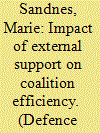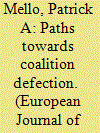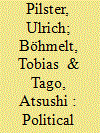|
|
|
Sort Order |
|
|
|
Items / Page
|
|
|
|
|
|
|
| Srl | Item |
| 1 |
ID:
192609


|
|
|
|
|
| Summary/Abstract |
This article examines the extent to which external actors influence the efficiency of the G5 Sahel Joint Force’s (G5S-JF) chain of command and what this means for the relationship between the G5S-JF and external actors. I argue that external actors have taken leading roles within the G5S-JF’s chain of command and that this external influence has increased the efficiency of the joint force’s command. This suggests that the relationship between the G5S-JF and external actors follows the logic of hegemonic theory, with external actors providing efficiency and stability through a strong leading voice, as other scholars have previously assumed. However, I demonstrate that there are limitations to a hegemonic understanding of this relationship, as it does not take into account the agency of the joint force. In fact, as things have developed, the hegemonic stability logic rather appears to have been proven wrong as the strong leading role of external actors was a contributing factor to Mali’s withdrawal in May 2022 and the subsequent instability of the joint force.
|
|
|
|
|
|
|
|
|
|
|
|
|
|
|
|
| 2 |
ID:
148152


|
|
|
|
|
| Summary/Abstract |
Approximately one-third of all interstate conflicts are multilateral, with the majority of these having a coalition of states fighting on at least one side. Despite the frequency of coalition wars, coalitions have not received much attention within the conflict literature. This paper presents the first general study on the effectiveness of coalitions during interstate wars. While there are many drawbacks to fighting as part of a coalition, the benefits of cooperation outweigh the cost, making coalitions more likely to win wars. An empirical examination of war outcomes between 1816 and 2007 confirms this hypothesis; coalitions have greater odds of victory than states fighting outside a coalition. This finding holds after controlling for possible endogeneity and selection bias.
|
|
|
|
|
|
|
|
|
|
|
|
|
|
|
|
| 3 |
ID:
171787


|
|
|
|
|
| Summary/Abstract |
Despite widespread public opposition to the Iraq War, numerous democracies joined the US-led multinational force. However, while some stayed until the end of coalition operations, and several increased their deployments over time, others left unilaterally. How to explain this variation? While some studies suggest that democratic defection from security commitments is primarily motivated by electoral incentives or leadership change, scholars have not reached a consensus on this issue. To account for the complex interplay between causal factors, this article develops an integrative theoretical framework, using fuzzy-set Qualitative Comparative Analysis (QCA) on original data on the Iraq War involvement of 51 leaders from 29 democracies. The findings document the existence of multiple paths towards coalition defection. Among others, the results show that: (1) leadership change led to early withdrawal only when combined with leftist partisanship and the absence of upcoming elections; (2) casualties and coalition commitment played a larger role than previously assumed; and (3) coalition defection often occurred under the same leaders who had made the initial decision to deploy to Iraq, and who did not face elections when they made their withdrawal announcements.
|
|
|
|
|
|
|
|
|
|
|
|
|
|
|
|
| 4 |
ID:
145725


|
|
|
|
|
| Summary/Abstract |
Several studies have claimed that changes in the political leadership of a country affect foreign policy decision making. The following paper systematically tests this in the context of states' participation in military coalition operations. By building on previous theoretical models, the authors argue that new leaders may differ from their predecessors in that the former (i) have dissimilar preferences with regard to the involvement in military interventions, (ii) evaluate relevant information differently, and (iii) are less likely to be entrapped in intervention policies. Ultimately, the net effect of these factors should make it more likely that political leadership turnovers are associated with premature withdrawals from ongoing military coalitions. The theory is tested by quantitative analyses of newly collected data on military coalition operations in 1946–2001 and a qualitative case study. The authors find strong and robust support for their argument.
|
|
|
|
|
|
|
|
|
|
|
|
|
|
|
|
| 5 |
ID:
166608


|
|
|
|
|
| Summary/Abstract |
How do states defect from multinational military coalitions? The question deserves considerable academic scrutiny, as states increasingly rely on coalitions to prosecute military missions. Yet to the extent that coalition defection has been explored, the extant literature tends to see defection as a binary undertaking – states are either in or out. In practice, however, defection is an act of risk minimization in a manner that forces other coalition partners to fill resulting operational gaps. A coalition can therefore appear stable due to a constant number of flags associated with the mission, but in practice be much less coherent and capable. After defining defection as a non-routine abrogation of operational responsibility at other coalition partners’ expense, significantly prior to mission conclusion, this article explores several states’ participation in Operation Iraqi Freedom and the various manners by which they defected from that coalition. It concludes with implications for future scholarship.
|
|
|
|
|
|
|
|
|
|
|
|
|
|
|
|
|
|
|
|
|